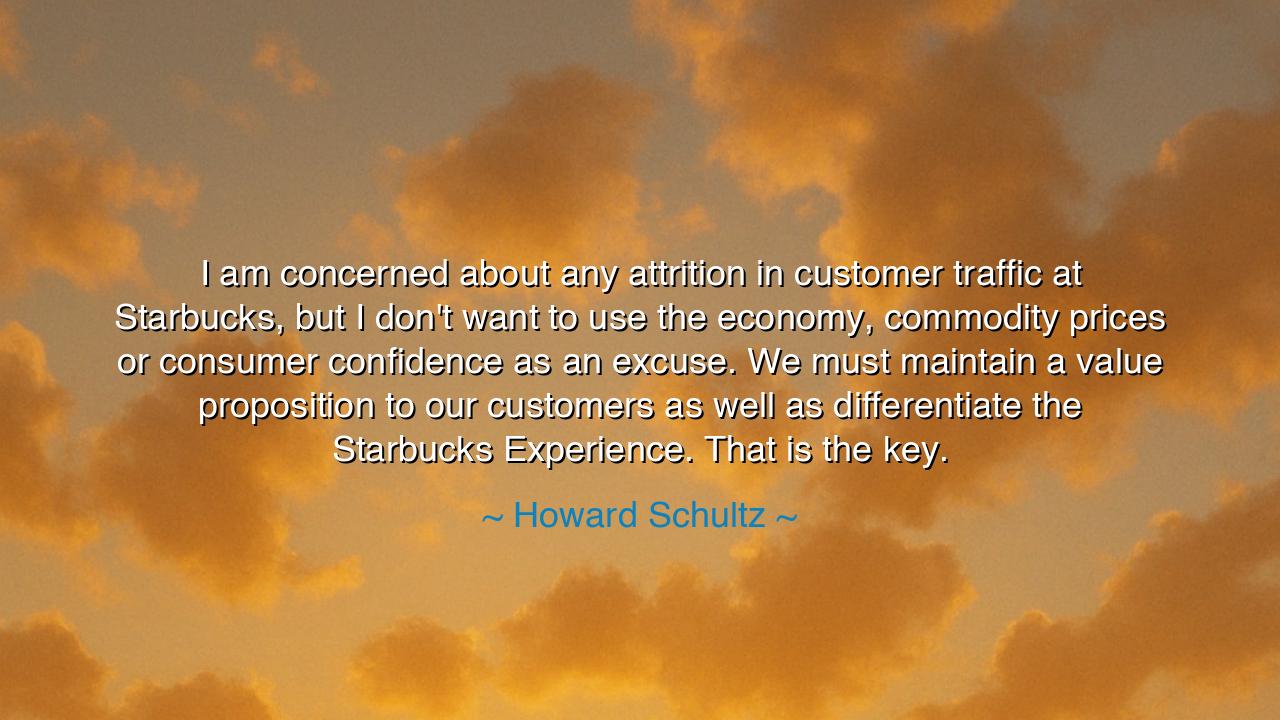
I am concerned about any attrition in customer traffic at
I am concerned about any attrition in customer traffic at Starbucks, but I don't want to use the economy, commodity prices or consumer confidence as an excuse. We must maintain a value proposition to our customers as well as differentiate the Starbucks Experience. That is the key.






“I am concerned about any attrition in customer traffic at Starbucks, but I don’t want to use the economy, commodity prices or consumer confidence as an excuse. We must maintain a value proposition to our customers as well as differentiate the Starbucks Experience. That is the key.” Thus spoke Howard Schultz, the visionary who built not merely a company, but a culture — a sanctuary of warmth amid the cold rush of commerce. His words, though born of the modern marketplace, carry the weight of timeless wisdom: that excellence does not seek excuses, and that to endure, one must always return to the essence of purpose.
When Schultz speaks of attrition and the economy, he acknowledges the storms that every enterprise must face — the shifting winds of circumstance, the tides of fortune, the unpredictability of the world. Yet he refuses to bow before them. “I do not want to use them as an excuse,” he says. This is the mark of true leadership — to stand firm when the ground quakes, to fix one’s gaze not on the chaos, but on the core truth that gives life to the endeavor. For in the end, it is not the market that destroys or sustains a vision, but the strength of the vision itself.
In speaking of value and differentiation, Schultz reminds us that all greatness is rooted in service — the ability to create meaning for others. The Starbucks Experience, as he names it, was never about coffee alone; it was about belonging, comfort, and connection — the feeling of being known in a place where strangers become companions. This, he teaches, is the true foundation of loyalty. To maintain that experience is to remember why one began, to protect the soul of the enterprise even as the world changes around it.
The ancients, too, knew this principle well. Consider the story of Marcus Aurelius, the philosopher-emperor of Rome. Besieged by wars, famine, and the discontent of the people, he might have blamed the world for his troubles. Yet in his Meditations, he wrote, “Do not blame circumstance; the impediment to action advances action. What stands in the way becomes the way.” Like Schultz, he understood that strength lies not in complaint, but in response — not in what happens to us, but in what we make of it. The emperor and the entrepreneur are thus united by one truth: that responsibility is the path to mastery.
Schultz’s words also speak to the human spirit, not just the world of business. Every soul, in its own way, must guard against attrition — the gradual erosion of passion, purpose, and care. Just as a company must renew its value to its customers, so must a person renew their value to themselves and others. When hardship strikes, the easy path is to blame the economy, fate, or others. The harder path — the noble one — is to ask, “How can I become better? How can I serve more deeply?” For when we stop using excuses, we begin to reclaim our power.
Look to the story of Thomas Edison, who failed a thousand times before the light bulb shone. He could have blamed materials, markets, or circumstance — but instead, he said, “I have not failed. I’ve just found ten thousand ways that won’t work.” This is the spirit Schultz invokes: the refusal to surrender responsibility, the conviction that creation and service are stronger than any adversity. Such faith transforms defeat into innovation, and difficulty into excellence.
Thus, the lesson is clear: whether in business, art, or life, never let excuses become your refuge. When the world grows uncertain, do not withdraw; instead, return to your core purpose — that which makes your work, your love, your calling unique. Remember that success is not sustained by circumstance, but by consistency of heart. The value you offer, the experience you create, and the truth you live by are your anchors when the seas of fortune grow rough.
Therefore, my friends, take this teaching into your own endeavors: Be the kind of soul who takes responsibility when others seek to blame. Build not on sand, but on purpose. Create not for profit alone, but for meaning. And when storms come, as they always do, let your actions — not your excuses — define you. For in every field, in every life, that is the key: to give of yourself fully, to hold fast to what is sacred in your work, and to keep the fire of excellence burning — until your light, like that of a great enterprise or a noble heart, warms the world around you.






AAdministratorAdministrator
Welcome, honored guests. Please leave a comment, we will respond soon